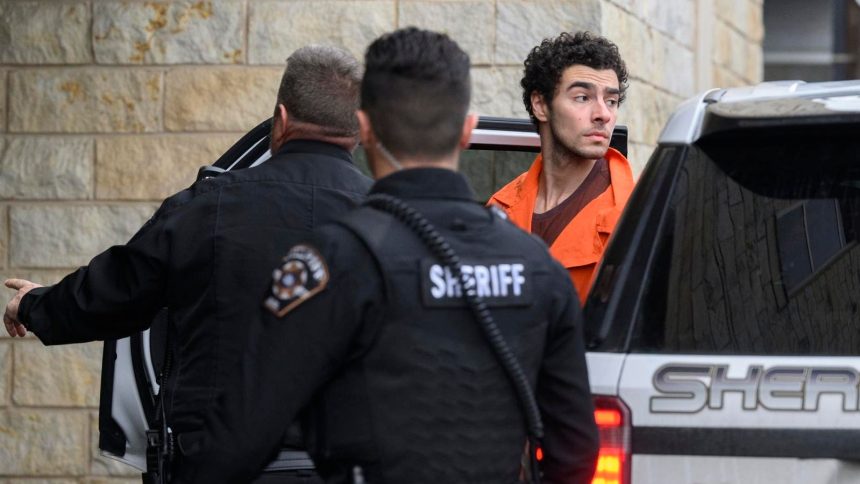Luigi Mangione, a 26-year-old former software engineer, has been indicted on charges of first-degree and second-degree murder in connection with the fatal shooting of Brian Thompson, CEO of UnitedHealthcare, in early December. Manhattan District Attorney Alvin Bragg announced the indictment, including a terrorism enhancement to one of the second-degree murder counts, stemming from the alleged targeting of a high-ranking corporate figure. The indictment follows Mangione’s initial arrest in Pennsylvania on charges related to the shooting, including weapons possession and forgery. Evidence presented by law enforcement links Mangione to the crime scene, including fingerprints on discarded items and a 3D-printed gun matching shell casings. A disturbing handwritten manifesto and a notebook detailing plans for the attack were also recovered upon his arrest. These documents, according to authorities, reveal Mangione’s apparent intention to “wack the CEO” as a symbolic act against corporate America.
The victim, Brian Thompson, was shot and killed outside the New York Hilton Midtown where he was attending a UnitedHealth Group investor meeting. The seemingly targeted nature of the attack, with Thompson being shot from behind while walking alone, initially puzzled investigators. While initial reports suggested possible threats against Thompson, no concrete information has been released publicly about their nature. The swift apprehension of Mangione was facilitated by public dissemination of his image, which led to his identification at a Pennsylvania McDonald’s and subsequent arrest. Authorities recovered fraudulent identification, the suspected murder weapon, and the incriminating handwritten notes. The attack has raised concerns about executive security, especially for high-profile figures in industries that often draw public scrutiny.
Mangione, described as having no prior criminal record, hails from a prominent Baltimore family with ties to real estate and philanthropy. His educational background reveals a trajectory of academic achievement, graduating as valedictorian from the Gilman School and earning degrees in computer and information science from the University of Pennsylvania. His professional life included internships at prestigious institutions and employment as a software engineer. However, reports suggest that a severe back injury may have contributed to a significant life change for Mangione, potentially leading to his radicalization. His online activity, including a Goodreads review of the Unabomber’s manifesto and discussions about his back pain on Reddit, provides further insights into his mindset. While Mangione initially resisted extradition to New York, he may now waive extradition, signaling a potential shift in his legal strategy.
The case has ignited a firestorm of online reactions, with a disturbingly large contingent expressing support for Mangione and framing him as a hero fighting against corporate greed. Online fundraisers for his legal defense, some attracting substantial donations, have been shut down for violating platform policies. The messages accompanying these donations often express outrage at the healthcare industry and echo Mangione’s apparent grievances. The unexpected outpouring of support for an alleged murderer has raised concerns about the potential for further violence and the dangers of online radicalization. Experts have noted the organic nature of this online support, tapping into existing public frustration with the healthcare system and the allure of vigilante justice. Law enforcement has even drawn parallels to the aftermath of domestic terror attacks, highlighting the potential for copycat incidents and the need to address the underlying societal issues fueling such sentiments.
Mangione’s defense lawyer, Thomas Dickey, has publicly questioned the strength of the evidence against his client, specifically raising concerns about the reliability of ballistics and fingerprint evidence. He has also acknowledged the numerous unsolicited offers to fund Mangione’s legal defense, though he has indicated that his client may not accept them. Dickey’s challenge to the evidence suggests a potential line of defense focused on casting doubt on the prosecution’s case, potentially arguing for a lesser charge or even acquittal. The upcoming legal proceedings will likely delve deeper into the specifics of the evidence and Mangione’s mental state at the time of the shooting.
The broader implications of this case extend beyond the legal proceedings. It has sparked a crucial conversation about the accessibility of 3D-printed firearms, often referred to as “ghost guns,” and their potential use in violent crimes. Additionally, the outpouring of support for Mangione online raises concerns about the growing influence of anti-establishment sentiment and the role of social media in amplifying extremist views. The case underscores the complex intersection of mental health, societal grievances, and the potential for violence fueled by online echo chambers. As the legal process unfolds, it will be crucial for both law enforcement and the public to grapple with these complex issues and their potential consequences.



